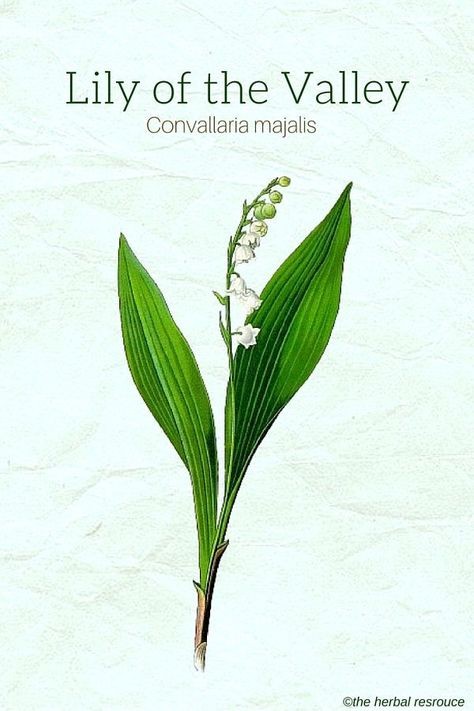
Lily of the valley, also known as Convallaria majalis, is a perennial plant with fragrant flowers that grows in woodlands in Eurasia and North America, and is a common garden plant. Despite belonging to the asparagus family, all parts of lily of the valley are poisonous to humans and animals. While traditionally used as an herbal remedy for certain cardiac conditions and other ailments, there is no scientific evidence to establish the safety and efficacy of lily of the valley.
Lily of the valley contains toxic compounds such as cardiac glycosides (cardenolides) and saponins. These compounds, particularly convallarin, convallamarin, and convallatoxin, increase the force of heart contractions and have gastrointestinal effects.
The suggested uses of lily of the valley include congestive heart failure, palpitations, irregular heart rhythm (cardiac arrhythmia), cardiac edema, cardiac asthma, circulatory disorders, kidney and bladder stones, and urinary tract infection.
Contents
Warnings
- Avoid lily of the valley if you have high blood pressure, kidney or liver disease, or potassium deficiency.
Side Effects
Common side effects of lily of the valley include nausea, vomiting, diarrhea, weakness, general malaise, altered mental status, drop in blood potassium levels, chest pain, slow heart rate (bradycardia), irregular heart rhythm (arrhythmia), extra or missed heartbeat (ectopy), and cardiac arrest. Seek immediate medical help if you experience any serious symptoms or side effects.
Dosages
Suggested dosing:
- 600 mg/day oral average amount
- Tincture: 6 g/day divided three times daily orally
- Liquid extract: 600 mg/day divided three times daily orally
- Dried extract: 150 mg/day orally
- Insufficient reliable evidence available for effectiveness
Overdose: Lily of the valley is poisonous and overdose can be fatal. Symptoms include nausea, vomiting, weakness, altered mental state, chest pain, low heart rate, irregular heartbeat, extra or missed heartbeat (ectopy), heart block, fibrillation, and cardiac arrest. Treatment is primarily symptomatic and supportive.
Drug Interactions
Inform your doctor of all medications you are currently taking. Lily of the valley has no known severe interactions with other drugs, but serious interactions may occur with specific medications.
It is important to always consult your healthcare provider before taking any herbal products, especially if you have underlying health conditions or are on regular medication.
Pregnancy and Breastfeeding
- Avoid using lily of the valley during pregnancy and breastfeeding due to lack of safety information.
- Consult your healthcare provider before using any herbal products while pregnant or breastfeeding.
Additional Information
- There are no studies on the safety and efficacy of lily of the valley for its suggested uses. It is a poisonous plant, so ingestion, even in small amounts, can be toxic and potentially fatal.
- If you choose to take lily of the valley, follow label instructions and do not exceed the recommended dose. Natural products may not always be safe, so it’s important to adhere to suggested dosing.
- Check with your healthcare provider before using any herbal products, including lily of the valley, especially if you have any health conditions or are on regular medication.
- Lily of the valley is marketed as an herbal supplement and is not regulated by the FDA. Exercise caution in choosing your product, as formulations and strengths may differ.
- Keep lily of the valley products out of reach of children.
- In case of overdose, seek immediate medical help or contact Poison Control.
By clicking Submit, I agree to the MedicineNet’s Terms & Conditions & Privacy Policy and understand that I may opt out of MedicineNet’s subscriptions at any time.
Summary
Lily of the valley, also known as Convallaria majalis, is a perennial plant used traditionally as an herbal remedy for certain cardiac conditions and other ailments. However, there is no scientific evidence to support its uses. Common side effects include nausea, vomiting, diarrhea, weakness, altered mental status, drop in blood potassium levels, chest pain, slow heart rate, irregular heart rhythm, and cardiac arrest.


